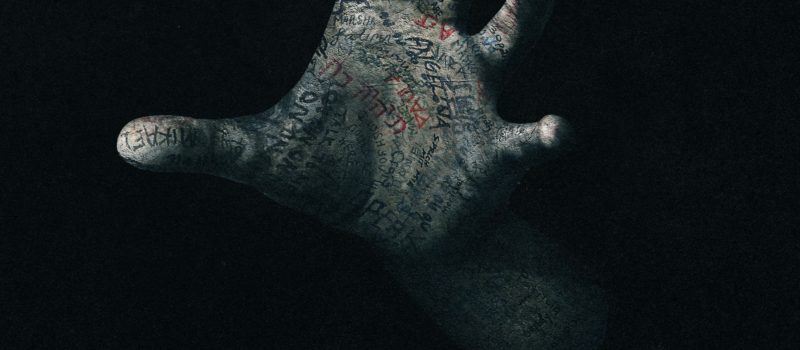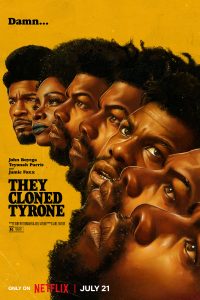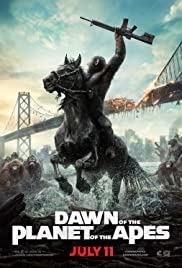Let The Right One In: Josh Pearce and Arley Sorg Discuss Talk To Me
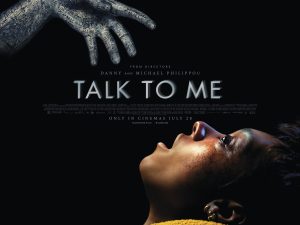 Kids these days! With their loud music and TikToks and demonic possession! Talk to Me, an Australian horror movie, focuses on a group of teens who use a talisman (supposedly a psychic’s amputated hand) to summon the dead and invite them to take over their bodies. It’s a neat party trick and, apparently, quite a rush.
Kids these days! With their loud music and TikToks and demonic possession! Talk to Me, an Australian horror movie, focuses on a group of teens who use a talisman (supposedly a psychic’s amputated hand) to summon the dead and invite them to take over their bodies. It’s a neat party trick and, apparently, quite a rush.
Arley: I found this to be very effective, like probably one of the most effective horror movies I’ve seen in a long time. I wouldn’t say that I was scared, per se because I just don’t scare that easily – but where I was meant to feel tension, I felt a lot of tension. I had a couple of jumps and even that is not usual for me. It was shocking, startling, things were unexpected. Reminiscent of some of the most striking moments of Hereditary in certain ways. Every now and then I’d be like, “Oh, surely they’re not gonna go there.” And they did!
Josh: I think “effective” is the right word for it. The intended mood and emotion got through. It’s a story about grief, like we mentioned in our review of Antlers — it’s a horror movie, but really, it’s so sad. This also reminded me of It Follows, in the sense that they establish simple rules, they stick to the rules, and then they just fuck everyone up along the way. There’s a typical kind of horror movie that’s throwing stuff at the audience, left and right, and it can’t keep track of what it’s doing, and everything’s broken — the rules are broken for convenience or because something has to happen in the plot — but in Talk to Me, the plot was moving along at its own pace, and the horror just came as a consequence of what they were doing.
Mia (Sophie Wilde) is still processing the untimely death of her mother (Alexandria Steffensen), preferring to spend time at her best friend Jade’s (Alexandra Jensen) house than at home with her grieving father (Marcus Johnson). Jade’s younger brother Riley (Joe Bird) and boyfriend Daniel (Otis Dhanji) are often along, and each of the four teens want to try out the hand for themselves.
When it’s Daniel’s turn, he summons a spirit that looks and sounds like Mia’s mother. The cruelty of hope. Otis Dhanji’s impersonation of Alexandria Steffensen’s mannerisms convinces the audience as much as it does Mia, and she starts to believe that this is more than just a diversion to distract her — this could be the solution to her pain.
Josh: This was all about writing and performance. All the performances were good.
Arley: Yeah, 100%, it just came together in such a way that it felt really real to me. You have the main character’s struggle, you have Riley struggling, you have different characters’ struggles.
Josh: A lot of good multilayered, developed roles. No one was really flat or throwaway. The main actor’s performance when she was first possessed was really good — her whole face transforms, her expression changes, and she’s really selling it that she’s acting like a different person. I think they all kind of had that broad range, but hers was pretty noticeable.
Over Jade’s objections, Daniel and Mia let Riley have just a taste. What occurs during his possession may not be for the squeamish, and marks a pivot point in the story. There is a danger here. These highschoolers are playing with fire.
Arley: This movie had a wonderful balance of predictable and taking things to unexpected places. It never felt random. It felt well considered. Everything made sense but there were enough surprises that were just… directions you didn’t expect them to go, while still making you feel confident in the narrative. If this is Australian filmmaking, we might need more Australian films?
Josh: I think Australia and New Zealand have a really good, burgeoning film industry. Danny and Michael Philippou, the directors, worked on The Babadook, for example, which informed the horror in this movie. And thanks to A24, we get an Adelaide Film Festival movie having a US theatrical release, which is great! In terms of surprises, I felt it was following its own internally consistent logic, while still exploring the knock-on effects of the worldbuilding. For example, when Mia’s in the hospital and she sees the girl, and the girl says, “I let you in.” You suddenly realize, oh, yeah, it can work both ways. They don’t dwell on it or oversell it. They just say, “This can happen,” and bounce to the next thing.
Arley: A lot of times, especially in horror movies, but just in movies in general, you have an internal sense of the limit for rawness or violence, or for who might get hurt – they’re not going to go past a certain point, and for this reason, a lot of times you never really worry about certain characters. I think they did a really good job here of instilling a sense that anything can happen to anyone. Nobody is safe, and you don’t fucking know what’s next. Which creates much higher tension.
Josh: That’s a good point. I didn’t know who was going to live or not. Is everyone gonna die? How far is this gonna go? They kept you on your toes because you couldn’t predict where they were going to draw the line. A couple of scenes were weird — creepy, but also funny. Like when she’s sucking on his toes.
Arley: This could be just sucking toes. She could go wild. You really don’t know. Even in movies where sometimes you’re not sure, it can just feel random and you kind of don’t really care. But here you actually feel stressed. I actually felt stressed by that scene, even though it’s also funny.
Some horror movies are clear metaphors: The Omen and Rosemary’s Baby symbolize the difficulty of raising children (who often act like monsters), Dawn of the Dead is a commentary on mindless consumerism, It Follows has been said to actually be about STDs. Talk to Me reads like a metaphor for drug use. The characters are explicitly told that if they stop using the hand, their bodies will reject the possession after enough time, like detoxing.
Mia gets hooked. She starts using it alone, for longer than the recommended time, desperate to talk to her dead mother. The spirit comforts her at first, but then starts to sow seeds of doubt that sprout into paranoia. It isolates her from her friends and family, and she refuses to listen to the concerns of anyone else.
Arley: Even that is really creative, because I’ve never seen anyone use the idea of possession as a party drug.
Josh: They didn’t really do a preachy “drugs are bad” kind of message. It’s just how this one speculative change in a world would affect things. I think it’s funny when they throw in weird shit, and then it just gets used for everyday stuff. We said it in our Parallel review — no one gives a shit about your miracle. Your miracle is just going to be become another thing used to get high or make money.
Arley: Except for this one thing, this particular party drug, these kids are kind of innocent. They’re not even having rampant sex and doing a lot of the things that some kids do.
Josh: The mom, Miranda Otto, was trying to trick them into admitting there was a party, and they’re just like, “What are you talking about? There’s no party.”
Arley: She knows that kids are kids, so she’s trying to find that balance. That felt really real to me, too. I believed her as a frustrated parent. And you could just see it on her face when she’s in the car outside the hospital, that feeling of, “I fucked up so bad. How do even I do this?”
Josh: Yeah, it’s the helplessness and the fear of being a parent where you can’t be there 24/7 to watch them and as soon as you look away, something happens and they get hurt. Like, well, what the fuck am I supposed to do? I can’t always protect them. You have to let them become people by themselves, so you can’t constantly control them.
This is a low budget film at $4.5 million, and Talk to Me makes use of every penny. Some of the tension comes through the simple technique of skillful sound design. Certain background noises are cranked to high levels, so much so that when Miranda Otto enters the house, it’s almost surprising that none of the other characters whip around in fear because of how loud the door is.
But this just serves to lull the audience into a false sense of security: when there’s a slap to the face, it’s as loud and startling as a gunshot. Visions of the dead are accompanied by background noise befitting their causes of death — anyone here play Left 4 Dead? A drowning victim in this film comes with the same burbling sound as a Boomer zombie.
A24 has produced some truly great films, such as the fantastic Everything Everywhere All at Once. Even in cases where a film might not work for some viewers, such as The Green Knight, if it’s an A24 film it’s still probably going to be really interesting. We need more effective, low budget movies that don’t rely on $100 million worth of CGI to get the point across. As written by Michael Schulman in The New Yorker:
An executive at a rival studio, who called the M.C.U. “the Death of All Cinema,” told me that the dominance of Marvel movies “has served to accelerate the squeezing out of the mid-range movie.”
Such dominance has led to an infinite loop of movies desperately shoveling CGI in front of an audience that has been conditioned to expect more and more of it (faster! Louder! All at once!) to the point that Marvel has single handedly burned out the entire visual effects industry, and post-production crews have now voted to unionize.
We should also note that A24 has received SAG-AFTRA approval to continue production during the current strike, because it is one of the few studios that has agreed to abide by union terms. A24, at least, appears committed to making movies, rather than mega-profits.
Josh: I think this is the third time we’ve pointed out a shocking slap in a horror movie. There was one in M3GAN and one in The Invisible Man. I really enjoy these smaller movies. This was not previous IP, which is nice. Independent films, different voices.
Arley: But what really sucks is that I can see it becoming a franchise and just cranking out really shitty versions.
Josh: I was originally going to say it might be insulated and protected just by being an Australian film, but the directors have already announced that they’ve written and partially filmed a prequel, and have plans for a sequel, so that’s a shame. We’re gonna ignore the sequels. This one ran its course, and there’s nothing more to say about the idea. You can only get away with the concept for so long before you become Paranormal Activity.
Directed by: Danny Philippou & Michael Philippou
Written by: Danny Philippou & Bill Hinzman
Starring [in Wikipedia order, not IMDB]: Sophie Wilde, Alexandra Jensen, Joe Bird, Otis Dhanji, Miranda Otto, Zoe Terakes, Chris Alosio, Marcus Johnson & Alexandria Steffensen
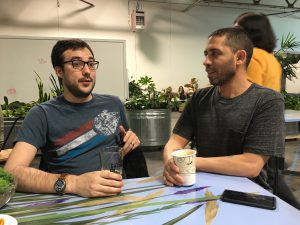
ARLEY SORG, Senior Editor, has been part of the Locus crew since 2014. Arley is an associate agent at kt literary. He is a 2022 Kate Wilhelm Solstice Award recipient and a 2023 Space Cowboy Award recipient. He is also a 2021 and 2022 World Fantasy Award finalist and a 2022 and 2023 Locus Award finalist for his work as co-Editor-in-Chief at Fantasy Magazine. Arley is a 2022 Ignyte Award finalist in two categories: for his work as a critic, and for his essay “What You Might Have Missed” in Uncanny Magazine. He is Associate Editor and reviewer at Lightspeed & Nightmare magazines, columnist for The Magazine of Fantasy and Science Fiction, and interviewer at Clarkesworld Magazine. He grew up in England, Hawaii, and Colorado, and lives in the SF Bay Area. A 2014 Odyssey Writing Workshop graduate, he can be found at arleysorg.com – where he has started his own “casual interview” series with authors and editors – as well as Twitter (@arleysorg) or Facebook.
JOSH PEARCE has stories and poetry in Analog, Asimov’s, Beneath Ceaseless Skies, Cast of Wonders, Clarkesworld, IGMS, Nature, and more. Find him on Twitter: @fictionaljosh, or at fictionaljosh.com. One time, Ken Jennings signed his chest.
 While you are here, please take a moment to support Locus with a one-time or recurring donation. We rely on reader donations to keep the magazine and site going, and would like to keep the site paywall free, but WE NEED YOUR FINANCIAL SUPPORT to continue quality coverage of the science fiction and fantasy field.
While you are here, please take a moment to support Locus with a one-time or recurring donation. We rely on reader donations to keep the magazine and site going, and would like to keep the site paywall free, but WE NEED YOUR FINANCIAL SUPPORT to continue quality coverage of the science fiction and fantasy field.
©Locus Magazine. Copyrighted material may not be republished without permission of LSFF.


